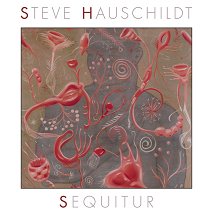 Steve Hauschildt steps out on Sequitur to make a case for himself as a talented producer of meticulously sequenced pop music. Like Emeralds' latest effort Just To Feel Anything, this record is a logical next step for Steve; rooted in new wave, techno, and a blend of genre exercise and timeless cohesion, and while it's common for ambient or electronic groups to evolve towards making pop-oriented albums, it's still a pleasant course that unfolds when handled with skill and subtlety.
Steve Hauschildt steps out on Sequitur to make a case for himself as a talented producer of meticulously sequenced pop music. Like Emeralds' latest effort Just To Feel Anything, this record is a logical next step for Steve; rooted in new wave, techno, and a blend of genre exercise and timeless cohesion, and while it's common for ambient or electronic groups to evolve towards making pop-oriented albums, it's still a pleasant course that unfolds when handled with skill and subtlety.
Sequitur's overly literal title is intended as a reference to 2011's Tragedy And Geometry, suggesting a natural conclusion to the ethereal, androgynous synth forms which characterized that record. The major contrast present in Sequitur that suggests a linear direction from that work is Hauschildt's vastly greater assortment of instruments and ideas on display. T&E was slightly pop-oriented minimalism, drawing all its melodies from the work of a single synthesizer and themes of hypersaturation and technology. Sequitur skips a step or two, jumping beyond the anticipatory revelations of "artist discovers verse-chorus songcraft," and heading straight for ambitious new ground, grafting his futurist stylings onto pop templates. It's the kind of forethought that suggests he's been working on these songs for far longer than I imagined.
For the most part, the pieces fit together. Standout tracks like "Interconnected" and "Constant Reminders" hit a nostalgic soft spot that perfectly blends Steve's unique sonic fingerprint with arpeggiated melodies, distorted guitars, drum machines, a vocoder (on the latter song) and an abundance of synthesized strings following familiar chord progressions like the theme song to a sci-fi cult classic. The breathtaking "Kept," meanwhile, ditches the percussion for cascades of ecstatic kosmische drone in a late-album highlight.
Hauschildt's cascading melodies assault the senses to the point of overwhelming, even as they would suggest otherwise. The polyrhythmic delays in the title track, for example, hit an apex at the two minute mark where there isn't a single spot unoccupied by sound. Every note and subdivision is filled with a pleasant blip or its fading echoes; the song reaches the last stage of agglutination where there's nothing left to add, after which the song dies out. The music's never harsh, but it is so unyielding that it borders on sensory overload. Steve presses on with this kind of additive style so often that when brief moments of silence do occur, they are all that much more welcome. It so happens that Sequitur's poppier songs—and the ones I enjoyed the most—are the songs that acknowledge how important those empty spaces are.
If I had to find one glaring problem with this album, it would be that Steve's weaker moments are on display in equal measure with his stronger ones. Tracks that don't stand out tend to retread the same ground, making for a pretty even split. This could be attributed to Hauschildt's obsession with sounding "pure"—which I would argue risks sacrificing a song's personality—but the better parts of the album share those same perfectionist qualities. They're just better, in a way I can't pinpoint. But that's the thing about pop; it thrives on those precious details. Hauschildt still hasn't quite found a niche for himself as a solo artist, but this is a promising leap forward. And at this rate it will take maybe one or two albums for Steve to perfect his formula.
samples:
 
Read More


